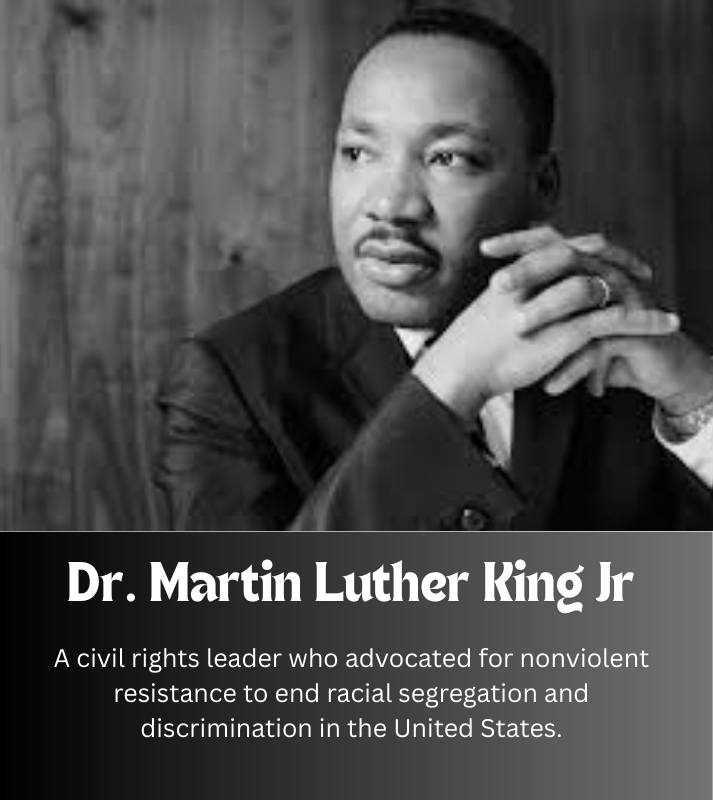Dr. Martin Luther King Jr
A Champion of Nonviolent Resistance


Dr. Martin Luther King Jr. was a Baptist minister and one of the most prominent leaders of the Civil Rights Movement in the United States from the mid-1950s until his assassination in 1968. He is celebrated for his use of nonviolent resistance and civil disobedience to fight for racial equality.
The Philosophy of Nonviolence
Inspired by the teachings of Mahatma Gandhi and his own Christian faith, King developed a philosophy of nonviolence that became the guiding principle of the Civil Rights Movement. He believed that this approach was not a sign of weakness but a courageous and powerful way to confront injustice. The core tenets of his philosophy included:
Nonviolent resistance is not for cowards: It is an active and spiritually strong method of confronting evil.
The goal is reconciliation, not humiliation: Nonviolence seeks to win the friendship and understanding of the opponent, ultimately creating a "Beloved Community" where people can live in peace and harmony.
The struggle is against injustice, not people: The focus is on defeating the evil system of segregation and discrimination, not on attacking the individuals who uphold it.
Accepting suffering without retaliation: King believed that unearned suffering could have a powerful redemptive and educational effect, transforming both the oppressor and the oppressed.
Choosing love over hate: Nonviolence requires refusing to hate the opponent, which King saw as an "internal violence of the spirit."
Faith in justice: A deep conviction that the universe is on the side of justice and that right will ultimately prevail.
Dr. Martin Luther King Jr.: A Champion of Nonviolent Resistance
Key Achievements and Milestones
King's leadership was instrumental in some of the most significant moments of the Civil Rights Movement.
Montgomery Bus Boycott (1955-1956): After Rosa Parks was arrested for refusing to give up her seat on a bus, King was chosen to lead a boycott of the city's bus system. The boycott lasted for 382 days and resulted in a Supreme Court ruling that declared bus segregation unconstitutional.
Founding of the Southern Christian Leadership Conference (SCLC) (1957): King helped found this organization to coordinate the efforts of various civil rights groups and to promote the use of nonviolent protest.
March on Washington for Jobs and Freedom (1963): King was a driving force behind this historic march, which drew over 250,000 people to the nation's capital. It was here, from the steps of the Lincoln Memorial, that he delivered his iconic "I Have a Dream" speech.
Nobel Peace Prize (1964): At the age of 35, King became the youngest person at the time to receive the Nobel Peace Prize for his work in combating racial inequality through nonviolent resistance.
Selma to Montgomery Marches (1965): The SCLC and other civil rights groups organized a series of marches to protest voting rights discrimination. The brutal attack on peaceful marchers, known as "Bloody Sunday," brought national attention to the issue and helped lead to the passage of the Voting Rights Act of 1965.
Legacy
Dr. King's legacy continues to resonate globally. His philosophy of nonviolent resistance has influenced movements for social and political change around the world. He posthumously received the Presidential Medal of Freedom and the Congressional Gold Medal, and his birthday is a national holiday in the United States. His life and work serve as a powerful reminder of the importance of courage, conviction, and peaceful action in the fight for justice.
Discover the extraordinary and unique stories.
Inspire
© 2025. All rights reserved.
